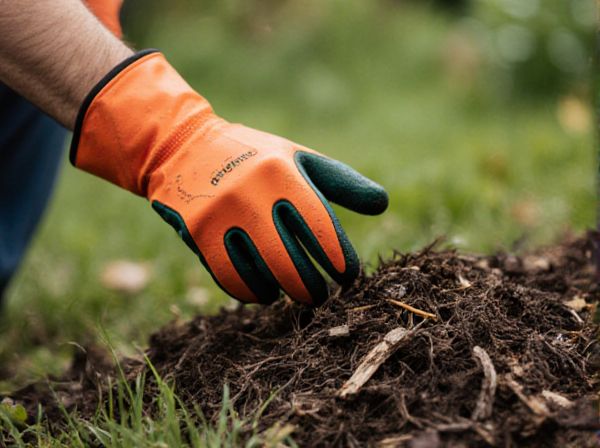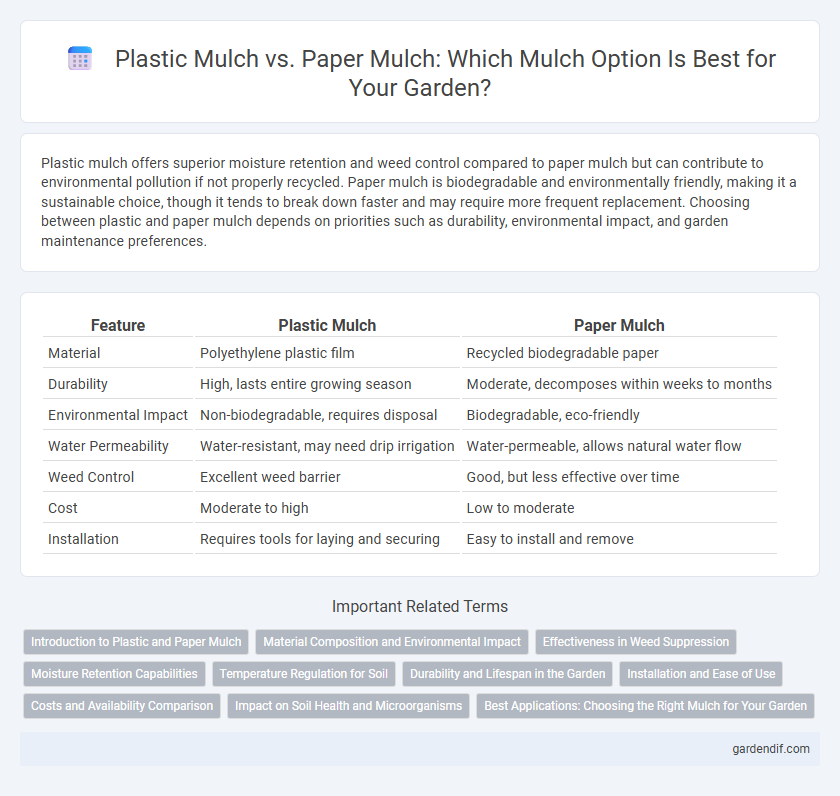
Plastic mulch vs Paper mulch Illustration
Plastic mulch offers superior moisture retention and weed control compared to paper mulch but can contribute to environmental pollution if not properly recycled. Paper mulch is biodegradable and environmentally friendly, making it a sustainable choice, though it tends to break down faster and may require more frequent replacement. Choosing between plastic and paper mulch depends on priorities such as durability, environmental impact, and garden maintenance preferences.
Table of Comparison
| Feature | Plastic Mulch | Paper Mulch |
|---|---|---|
| Material | Polyethylene plastic film | Recycled biodegradable paper |
| Durability | High, lasts entire growing season | Moderate, decomposes within weeks to months |
| Environmental Impact | Non-biodegradable, requires disposal | Biodegradable, eco-friendly |
| Water Permeability | Water-resistant, may need drip irrigation | Water-permeable, allows natural water flow |
| Weed Control | Excellent weed barrier | Good, but less effective over time |
| Cost | Moderate to high | Low to moderate |
| Installation | Requires tools for laying and securing | Easy to install and remove |
Introduction to Plastic and Paper Mulch
Plastic mulch, made from polyethylene films, offers high durability, moisture retention, and weed control, making it popular in commercial agriculture. Paper mulch, composed of biodegradable materials, provides an eco-friendly alternative that breaks down naturally, improving soil health over time. Both types serve to enhance crop growth by regulating soil temperature and moisture but differ in environmental impact and disposal methods.
Material Composition and Environmental Impact
Plastic mulch, typically made from polyethylene, offers durability and effective weed suppression but contributes significantly to plastic waste and soil pollution if not properly recycled. Paper mulch, composed of biodegradable cellulose fibers, decomposes naturally, improving soil health and reducing landfill impact while providing moderate weed control. The environmental impact of paper mulch is notably lower, supporting sustainable agriculture through reduced plastic pollution and enhanced soil organic matter.
Effectiveness in Weed Suppression
Plastic mulch demonstrates superior effectiveness in weed suppression by creating an impermeable barrier that blocks sunlight, preventing weed seed germination. Paper mulch, while biodegradable and environmentally friendly, allows some light penetration and water permeability, resulting in less consistent weed control. Studies indicate plastic mulch reduces weed biomass by up to 90%, whereas paper mulch achieves approximately 60-70% suppression under similar conditions.
Moisture Retention Capabilities
Plastic mulch offers superior moisture retention by creating a non-porous barrier that minimizes water evaporation and maintains consistent soil moisture levels, making it ideal for drought-prone areas. Paper mulch, while biodegradable and environmentally friendly, allows greater moisture permeability, resulting in moderate retention that may require supplemental irrigation. Research indicates plastic mulch can reduce water usage by up to 30% compared to paper mulch in agricultural applications.
Temperature Regulation for Soil
Plastic mulch offers superior temperature regulation by absorbing and retaining heat, effectively warming the soil and promoting early plant growth. Paper mulch provides moderate insulation, maintaining soil temperature more consistently but with less heat retention compared to plastic. Choosing between plastic and paper mulch depends on desired soil temperature control for specific crops and local climate conditions.
Durability and Lifespan in the Garden
Plastic mulch offers superior durability and can last throughout an entire growing season without significant degradation, making it ideal for long-term garden projects. Paper mulch, while biodegradable and eco-friendly, typically breaks down faster, lasting only a few weeks to a couple of months depending on weather conditions. Choosing plastic mulch ensures extended soil temperature regulation and weed control, whereas paper mulch requires more frequent replacement to maintain its effectiveness.
Installation and Ease of Use
Plastic mulch offers simple installation with pre-formed rolls that can be quickly unrolled and secured, reducing labor time significantly in large-scale farming operations. Paper mulch requires more careful handling to prevent tearing and often needs additional materials like staples or adhesives, making the installation process more time-consuming. Farmers seeking efficiency typically prefer plastic mulch for its durability and ease of deployment, while paper mulch is favored for its environmental benefits despite the extra effort required.
Costs and Availability Comparison
Plastic mulch typically incurs higher upfront costs due to material and installation expenses but offers advantages in durability and reusability, which can reduce long-term expenses. Paper mulch is generally more affordable and biodegradable, simplifying disposal and lowering environmental impact, although it may require more frequent replacement. Availability varies regionally, with plastic mulch widely accessible through agricultural suppliers, while paper mulch availability depends on demand and eco-conscious markets.
Impact on Soil Health and Microorganisms
Plastic mulch creates a barrier that limits water infiltration and gas exchange, potentially disrupting soil microbial activity and reducing nutrient cycling. Paper mulch, being biodegradable, enhances soil health by improving moisture retention and supporting beneficial microorganisms involved in organic matter decomposition. Research indicates paper mulch fosters a more diverse microbial community, promoting long-term soil fertility compared to plastic alternatives.
Best Applications: Choosing the Right Mulch for Your Garden
Plastic mulch excels in vegetable gardens, particularly for heat-loving crops like tomatoes and peppers, by conserving soil moisture and suppressing weeds effectively. Paper mulch is ideal for organic gardening and flower beds, offering biodegradable benefits that improve soil health without chemical residues. Selecting the right mulch depends on crop type, environmental impact preferences, and desired soil temperature regulation.
Plastic mulch vs Paper mulch Infographic

 gardendif.com
gardendif.com